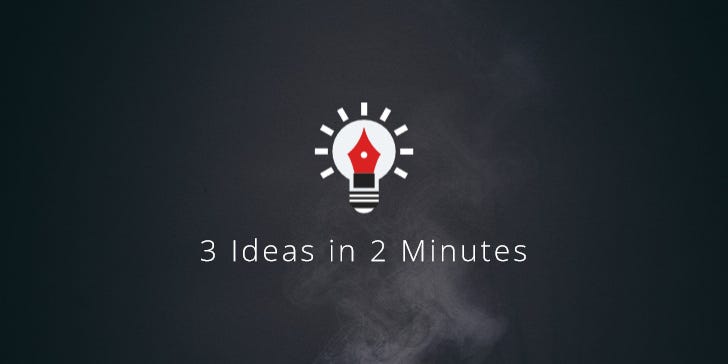#226: Falkland’s Law, Naval's Compass & the Siege of Zhao
3 Ideas in 2 Minutes on Practical Decision-Making
I. Falkland’s Law
When there is no need to make a decision, don’t make a decision.
Every decision carries a cost. Time, mental energy or potential consequences. Acting too soon or unnecessarily can create problems or commit you to needless complexity.
Falkland’s Law encourages patience and observation. By waiting until a decision is genuinely required, you often gain more information, see clearer options and can choose more wisely. It’s a way to avoid unnecessary stress and reduce the risk of errors.
The law is named after the 1982 Falklands War, when the Argentine government made a rushed decision to reclaim the Falkland Islands from the United Kingdom. The engagement ultimately backfired, resulting in a major loss for Argentina.
Falkland’s Law also complements the concept of Stopping Decisions. It reminds us not to overcommit or undercommit effort before or until a decision is necessary.
II. Naval’s Compass
Naval’s Compass is an extension of Naval Ravikant’s decision-making heuristic, “If you can’t decide, the answer is no.”
If two equally difficult paths, choose the one more painful in the short term (pain avoidance is creating an illusion of equality).
When two paths seem equally hard, the one that hurts more now is usually the one that pays off later. Because comfort creates a false sense of balance that hides future costs behind present ease.
III. Siege of Zhao
Besieging Wei to rescue Zhao is a stratagem rooted in the warfare principles promoted by Sun Tzu in The Art of War.
During China’s Warring States period, the State of Wei besieged the State of Zhao. Zhao asked the State of Qi for help. But instead of attacking Wei’s forces directly (where they were strong and concentrated), Qi attacked Wei’s capital. Wei’s army had to abandon the siege of Zhao to rush back to defend their homeland. Qi’s smaller army defeated them during the retreat. Zhao was saved without ever engaging the besieging army head-on.
The principle here is incentive-based decision manipulation: attack indirectly to divert the enemy. Instead of confronting strength with strength, hit a vital or lightly defended interest elsewhere so the opponent is forced into a dilemma. 🐘
Have a great week,
Chris
themindcollection.com


I worked with an Army Major, now a General, who really embodied Falkland's Law. He used it to manage meetings and he was a master at it. He was usually the senior member at many meetings we attended and could have taken over but he waited and watched and learned, not only the topic of the meeting, but also the arguments for and against, as well as, the factions promoting either side. Halfway through any meeting, he would start asking very pointed questions to lead the group to a reasonable solution. I learned so much about management from him that I used for the rest of my career.
Complete side note: I am finishing my first book on Biblical analysis and wanted to let you know that an old column of yours was one of my first sources. Here is how you appear in the references: Meyer, Chris. “The Tenth Man Rule: How to Take Devil’s Advocacy to a New Level.” The Mind Collection, undated (https://themindcollection.com/the-tenth-man-rule-devils-advocacy/, accessed 11 Feb 2022) If I blew the citation, please let me know before I publish!